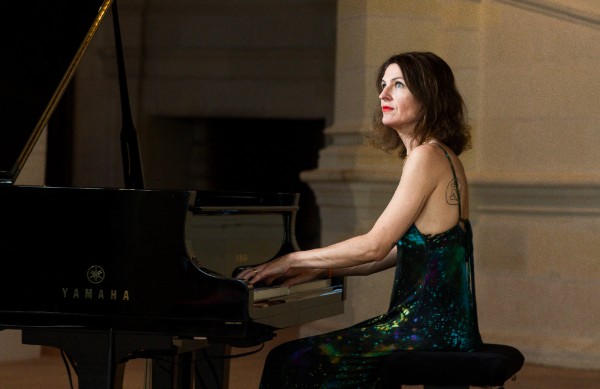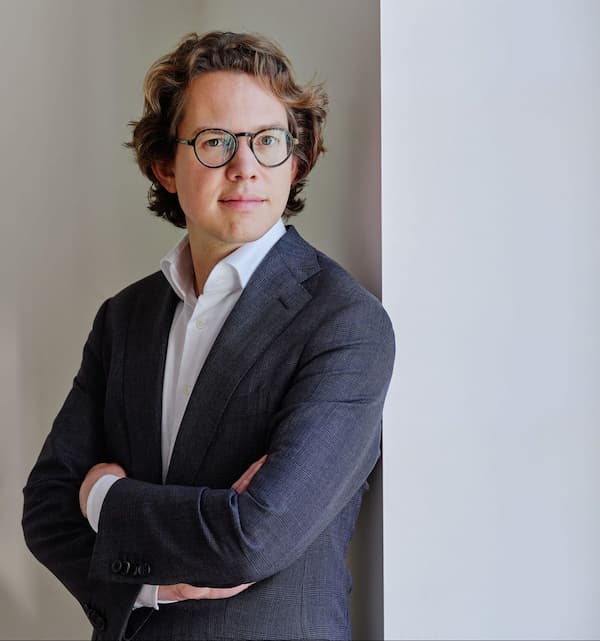‘Poetry and Imagination’

Vanessa Wagner © vanessawagner.net
French pianist Vanessa Wagner has made a name for herself as ‘the most delightfully singular pianist of her generation’ (Le Monde), combining a mastery of familiar repertoire with a curiosity spanning a huge range of genres and styles, equally at home giving a Clementi recital on the pianoforte as collaborating with electronic music producers and choreographers in exciting cross-disciplinary performances.
Vanessa won Instrumental Soloist of the Year at the 1999 Victoires de la Musique Classique awards and has since performed in venues all over the world, including across France, Italy, Brazil, the UK, New York, Japan and China. Her musical taste was always eclectic, although it was only around 10 years ago that Vanessa fully embraced the diversity of her interests in her performing work.
We talk about this change of direction, including Vanessa’s view on the wider industry and her own personal journey to artistic authenticity.
Ravel Landscapes – Live
How did you come to the piano as a child? What inspired you to become a musician?
My parents were teachers, but not musicians. I am the first artist in my family, but the first piano in my life was that of my great-grandmother, even though she wasn’t a musician. She practised only for herself, and when she went into hospital, her piano came to our home.
My sister played the guitar, and my parents said I could practise the piano. In the beginning, it was just a hobby, and I had the luck to meet my first teacher, who was a great musician, a great pianist. He was a student of Alfred Cortot, who is a legendary French pianist, and so to meet him as a kid was extremely lucky.
He’s the one who told my parents that I was especially gifted. Each time I didn’t want to practise, my parents would say, ‘She doesn’t like the piano, so perhaps she can stop,’ but my teacher told them that I couldn’t quit!
How did your first teacher inspire you?
He was an incredible teacher and artist. Even when I was a child, he spoke to me in a very poetic way. He wanted me to see music as a world of poetry and imagination, and that was my first contact with music. Music wasn’t only technique and hours spent at the piano. It was also something very emotional and about imagination and colours.
I think it built my personality as a musician today, having this beginning. My parents wanted me to have a sense of culture, so I went to museums a lot, as well as the cinema. I did a lot around music, and I think for me as a musician, it was very important.
You are known for embracing music of many different periods, styles and genres. It feels like that early experience helped shape the career you have today.
Since I was a kid, my personality was really built like that. I’m really open-minded and curious about a lot of things, and I can’t play just Beethoven, Chopin and Liszt my whole life.
I see music as a very open and very loose field of expression, and I don’t want to be in a prison. Sometimes, the way people around ask you to do this job can feel very tight, and to grow up and know who you are and know exactly what you want takes time. Nowadays, I can say that I’m very ‘myself’ in my career.
Did you feel pressure when you were younger to focus on the ‘grand’ piano repertoire, the pieces that everybody knows and performs?

Vanessa Wagner © Ludovic Letot
I think it’s very important to go to these main pieces, to learn them and to sometimes ‘fight’ with them. After all, they are masterpieces. You have to learn things about musicology, about styles, technique, and you have to confront yourself as a musician, as a pianist, because they are big pieces of repertoire.
I feel that around 10 years ago, I took a step forward, and this step made me more alive. I was in a place where I didn’t exactly feel myself, doing this job and career in a very ‘typical’ way. The step I made was almost a step of survival because I felt something was wrong inside me, and I didn’t feel ok.
What comprised this leap of faith from 10 years ago?
Since I did it, I found much more freedom and authenticity in what I have to say and do. Now, along with ‘big’ repertoire, I do contemporary music, I sometimes do pianoforte, and I do a lot of American minimalism. I also have some partnerships with electronic musicians, and I’m the artistic director of two festivals.
It gives me something very full, and it’s very open in the way I do my job: it’s not just doing one concert after another with the same repertoire, because I don’t want to take risks. I can’t do that.
Promoters and the press like young people, new discoveries. I can say now that I’ve played concerts for 30 years, and I am much more confident and sure about what I want and where I want to go now that I am 50, compared to when I was 20. When I was 20, I was a bit lost, and when you dive into this uncertain life, to be an artist is very insecure – you try to be like others, or be like the successful ones. You don’t dare to be yourself if ‘yourself’ is a bit different.
Since I was very young, I think I felt that I wasn’t comfortable in this very normalised way, because even when I was a teenager, I was listening to all types of music. I like pop music very much, and a bit later, electronic music followed. I didn’t want to be a young ‘classical’ pianist.
How do you feel now, having made the decision to diversify your career in such a way?
Now I feel absolutely myself. I have some experience, and I feel a legitimacy from the press and promoters give me, because I’ve been invited to play a lot and I’ve won some awards, so I feel more confident. I also felt that perhaps I had something new to say, and especially now, I don’t feel obliged to follow the path that so many musicians did before me and will do after me.
Do you have a particularly memorable concert experience?
I like to go to festivals with an audience who are not familiar with solo piano concerts. I did a concert in a non-classical festival where the audience took a bus and didn’t know what they were going to see. I’ve done this kind of thing several times, and each time it was very magical.
It was extremely moving because the audience was without any prejudice, and the moment felt very intimate.
Recently, I also played in a festival with all types of keyboards, not just the piano. I did a recital where the music I played was almost all unknown, and it was extremely powerful because people told me it was great to hear beautiful music that they didn’t already know.
If you look at [recital] programmes, you can see that 90% of the time it’s always the same pieces and composers who get played. I like to play in big halls, with something very powerful – to be at the Paris Philharmonie, for example, is amazing – but I also like to go into smaller places with a more intimate audience.
What inspired your musical change of direction?
One day, I met Murcof, an electronic music producer, and we had a chance to play together very briefly during a concert, and after that, we wanted to try something else together.
I did this recording called Statea – it’s a meeting between acoustic piano and electronic music, around minimalism, Arvo Pärt, Philip Glass, John Adams. It’s not the first time classical and electronic music have had this kind of meeting, but for me, on a personal level, it marked the start of my freedom.
You can think whatever you want about that project, and some people didn’t like it at all, but a lot did. Now, ten years later, a lot of listeners still talk to me about it, including fellow musicians. In a way, perhaps this opened some minds and some doors, and for me, personally, it was a way of telling people what I wanted to do now.
Vanessa Wagner – Dead Things [Philip Glass, arranged by Nico Muhly]
What do you do in your spare time?
I go to museums, to exhibitions, to see contemporary art. I spend time with my kids and my friends, and I do some sports. In a way, I’m very busy, so I don’t have so much free time.
I don’t have a ‘hobby’ because music takes up so much space in my life. It’s a full-time job, and not only a job – it’s a way of life. Since I was a kid, it has taken up a lot of space inside me.
To be a musician is beautiful because it’s very deep: to be inhabited by music and feelings, and even to go on stage and be rewarded by the audience – the emotions you can feel on stage are extremely powerful.
I’m very, very grateful for this life, but in a way, you also don’t have a ‘normal’ life. You can’t take vacations when you want, you can’t have much free time. You are permanently a bit anxious about what’s coming next. You can’t be calm and quiet!
For more of the best in classical music, sign up for our E-Newsletter




